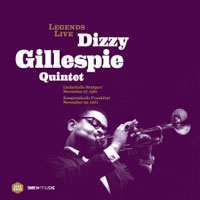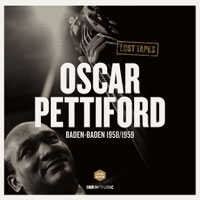Dizzy Gillespie Quintet • Legends Live
Oscar Pettiford • Lost Tapes
here is something uniquely enduring about the music from jazz's heyday in the 1950s and '60s -- the music of Miles and Dizzy, Monk and Evans, Coltrane and Rollins, Ellington and Basie, among that of so many other giants who strode the earth at the same time. For me, it has a great deal to do with these being jazz's formative years, when the music was being invented and reinvented all at once, when so many of the greatest innovators were at the height of their creative powers. While there is important jazz being played and recorded today, it will always be missing the Big Bang vitality that is evident in so much of the music that's now classic. For audiophiles, the appeal of this music is as powerful today as it ever was. Mobile Fidelity, Analogue Productions, Music Matters, Original Recordings Group, Impex, Pure Pleasure and Speakers Corner regularly reissue the work of musicians who passed away decades ago, these labels' catalogues not being all that different from what you would have found in the record stores of the day. All of this makes the Jazzhaus label even more intriguing. While you will recognize the performers who headline the label's LPs, the performances are essentially new, drawn from the archives of Südwestrundfunk (SWR), a public-broadcasting radio network serving southwest Germany, with studios in Stuttgart, Baden-Baden and Mainz. Beginning in 1947, SWR recorded renowned jazz musicians who toured Europe -- a common occurrence for American musicians of stature. The SWR archive contains more than 1600 audio-only and 350 audio-video recordings featuring just about every major modern jazz artist. According to Jazzhaus, this is "probably the biggest collection of unpublished live jazz recordings in the world," comprising 3000 hours of material, almost all of it never before released. Grab a bib, because we're talking here about recordings from the cream of the jazz crop: Chet Baker, Dave Brubeck, Art Blakey, Miles Davis, Ella Fitzgerald, Gerry Mulligan, The Modern Jazz Quartet, Zoot Sims, Ben Webster, Joe Henderson, Cannonball Adderley, Roland Kirk, Max Roach, Archie Shepp, Don Cherry, Charlie Haden, Thelonious Monk, Eric Dolphy and many others. These recordings are released under series with names like Lost Tapes and Legends Live, the former clearly being a teaser but the latter being literally true. Who wouldn't want to hear "a jam session with Miles Davis, Lester Young and The Modern Jazz Quartet," or "a riveting recording of Art Blakey's Jazz Messengers made shortly after their first Blue Note recording"? Unfortunately, these are not among the first eight LPs released, which include the pair covered here along with sets from Jutta Hipp, Zoot Sims, Cannonball Adderley and Gerry Mulligan. Each LP comes with a certificate for a free download of the same music; unfortunately, it's in MP3 format. Curiously, according to Jazzhaus, the LPs "are mastered from the original analog tapes but the mastering itself is processed digitally," meaning that the records are cut from digital sources -- 24 bits/48kHz right now, but 96kHz will be used in the future. The 180-gram LPs are produced with the Direct Metal Master process and pressed at Optimal Media, which has six locations in Europe. Oh, yes, the music. Oscar Pettiford was a major figure in the 1950s, a bop pioneer who began on piano before switching to bass as a teenager. He died from injuries sustained in a car wreck in September 1960, a year after the second of these sessions was recorded in Baden-Baden, his star firmly on the rise. He plays with a lineup of Europeans, including Hans Koller on tenor sax and Hans Hammerschmid on piano, and two fellow Americans, Kenny Clarke on drums and Lucky Thompson on soprano sax. These numbers are mostly standards performed with suppleness and grace, Pettiford playing either bass or cello. One of Pettiford's first regular gigs was as a member of Dizzy Gillespie's quintet. These live sessions from Stuttgart and Frankfurt were captured a year after Pettiford's death, the lineup including Lalo Schifrin on piano and Leo Wright on alto sax and flute. Known by this time as one of the most muscular and fiery trumpeters, Gillespie punctuates "The Mooche" with his trademark powerful runs, but Wright manages to overshadow him on a lyrical, charming version of "Willow Weep For Me." Given the conversion from analog tape to digital files to analog LP, I was more than a little suspicious of the sonic outcome, thinking that Jazzhaus might not achieve any better results than Doxy, which also cuts from digital sources -- probably CD at best. While I've noted frequently that many modern reissues sound better than original pressings, the Doxy titles are not among them. The vinyl is flat and quiet, but the records I've purchased sound like bad digital: thin, wiry, grainy and obviously inferior to well-done LPs from analog sources. From my limited experience, if you are considering a Doxy LP, you would be much better off with any other version. There aren't other versions of the Jazzhaus LPs, but even with analog-to-digital-to-analog conversion (and the corresponding insult to my purist sensibilities), I have to admit that the sound is very good -- appropriately dynamic, well focused and layered, even as large as life at points -- and the vinyl is heavy, flat and quiet. While mono or stereo is not indicated anywhere on the sleeves or the records themselves, Jazzhaus has stated that 1961 is the transition point, with everything after being in stereo, putting these sessions in mono. This oversight aside, I can find nothing to carp very loudly about here, although I'd still like to hear all-analog versions of these LPs. So far Jazzhaus has not only produced records worth
buying but a catalogue worth watching. If you're weary of the constant rehashing of
evergreens, Jazzhaus's treasure trove of unreleased music promises rewards for those who
just can't get enough classic jazz. |


